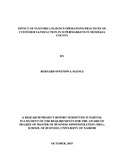| dc.description.abstract | The study focus was to establish the relationship between in-store logistics operations practices on customer satisfaction in supermarkets in Mombasa County. The objectives of the study were as follows: determine the in-store logistics operations practices that have been adopted by supermarkets in Mombasa County, establish the effect of in-store logistics operations practices on customer satisfaction and to determine the challenges faced by the supermarkets when adopting in-store logistics operations practices. The study used descriptive cross sectional census survey design which describes people responses to questions about a phenomenon and perceptions. The study population was 10 supermarkets based on Mombasa County. The data collection was done by use of questionnaires that we administered to the respondents using drop and pick later method. The respondents were supermarket managers because they were deemed to be well versed with in-store logistics operations practices in their respective supermarkets. Descriptive statistics such as mean, standard deviation and frequency were used in the analysis. The study used correlation analysis to establish the relationship between independent variables (in-store logistics operations practices) and dependent variable (customer satisfaction). The study also used regression analysis to establish the association between independent variables and dependent variable. The study found out that supermarkets adopted a variety of in-store logistics operations practices in the areas of forward and reverse logistics, in-store activities, inventory management, multi-retail activities and data management and master store planning. The study also found out that customer satisfaction improved as a result of adopting in-store logistics operations practices. It was also established that the model had a moderate explanatory power of the relationship between in-store logistics operations practices and customer satisfaction. From the findings of the study, the researcher recommended that supermarkets should adopt forward and reverse logistics, in-store activities, inventory management, multi-channel retail activities and data management and store planning in-store logistics operations practices because they contribute to customer satisfaction. However, forward and reverse logistics operations practices was found to require careful management because it can easily lead to customer dissatisfaction if mismanaged. Policies and guided frameworks on integration of in-store logistics operations practices on routine operations of supermarkets were also recommended. | en_US |

